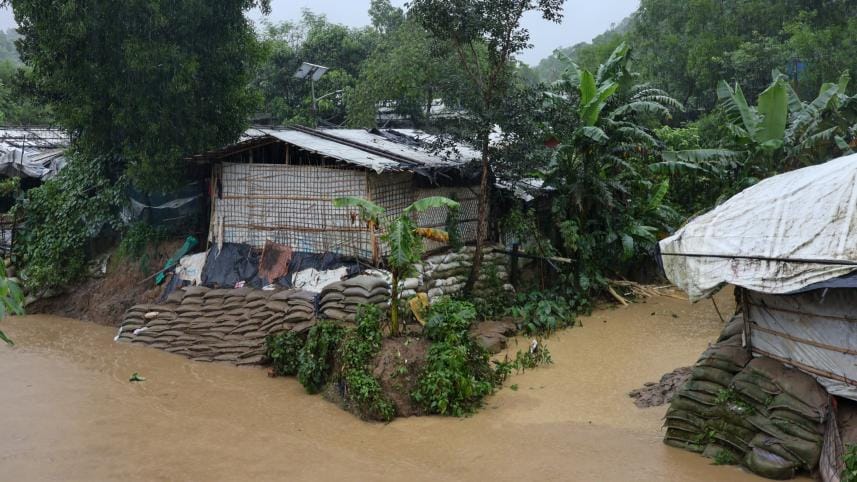Torrential rain triggers flash floods in Cox’s Bazar, inundating over 80 villages

Torrential rain over the past week has led to flash floods across Cox's Bazar, submerging more than 80 villages and leaving thousands of residents stranded, with Teknaf upazila worst hit.
The Cox's Bazar Meteorological Office recorded 694mm of rainfall in the first seven days of July, according to assistant meteorologist AB Hannan.
"This is considered heavy rainfall, as the average daily rainfall in the district is over 99mm," he said.
"July is the month with the highest rainfall in Bangladesh, with rain usually falling on about 22 days. The current spell is expected to ease from July 9, followed by a two-to-three-day break, after which rainfall may increase again," he added.
Last year, Cox's Bazar saw 1,706mm of rain in July.
"That record may be broken this month," the meteorologist said.
Among the six disaster-prone upazilas, Teknaf has been most severely affected. Around 40 villages there have been flooded, marooning nearly 50,000 people, according to local public representatives.
In Whykong union, eight villages are underwater; in Hnila union, 12 villages; Teknaf Municipality, seven areas; Teknaf Sadar Union, six villages; Sabrang Union, seven villages; and Baharchhara Union, 10 villages.
Teknaf Upazila Nirbahi Officer (UNO) Sheikh Ehessan Uddin said several areas were now waterlogged due to the downpour.
"We are monitoring the situation and staying in touch with the locals," he said.
Mohammad Ali, acting chairman of Hnila union, confirmed flooding in 12 villages, affecting over 4,000 families. Roads have gone under water, disrupting communications.
Ziaur Rahman, chairman of Teknaf Sadar union, said six villages — including Moheshkhaliapara, Natun Pallanpara, Tulatuli, Lengurbil, Khonkarpara, Mathpara, and Rajarchhara — have been submerged.
On Saint Martin's Island, tidal surges and rough sea conditions pushed seawater into multiple villages. Poor drainage and ongoing rainfall have made matters worse.
In Ukhiya upazila, runoff from nearby hills has triggered flash floods in around 16 villages, affecting approximately 10,000 people, said UNO Kamrul Hossain Chowdhury.
"Incessant rain caused the flooding. If there is a 5–6 hour break, the water may recede. However, many roads in the upazila have been severely damaged," he said.
Floodwaters also hit refugee camps 3, 7, 12, and 22 in Ukhiya, impacting nearly 15,000 residents. NGOs are working to manage the damage and provide relief to the affected.
In Ramu upazila, water from the swollen Bakkhali River has flooded about 1,000 homes in 10–12 villages of Fatekharkul, Rajarkul, and Srikul, as well as in Banglabazar and Khurulia of Jhilongja Union under Cox's Bazar Sadar upazila.
Meanwhile, the Matamuhuri River has overflowed, inundating more than 2,000 homes in Chakaria and Pekua upazilas.
Across these three upazilas, at least 10,000 people have been marooned.
Md Salauddin Ahmed, sub-divisional engineer of the Cox's Bazar Water Development Board, said water levels in the Bakkhali and Matamuhuri rivers have risen near danger levels, flooding many riverside areas.
He added that parts of embankments in Moheshkhali and Kutubdia have been damaged due to strong water surges, and repair efforts are underway.



 For all latest news, follow The Daily Star's Google News channel.
For all latest news, follow The Daily Star's Google News channel.
Comments